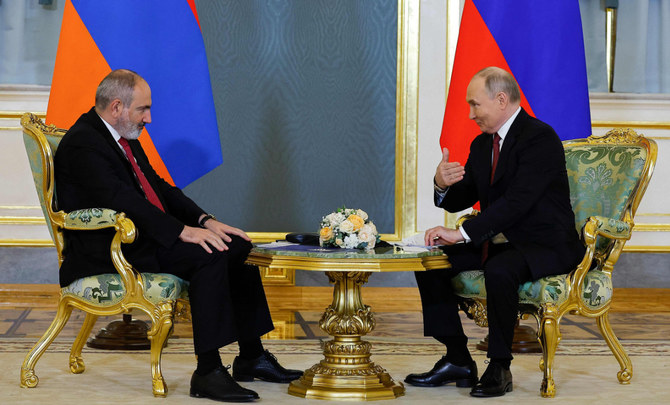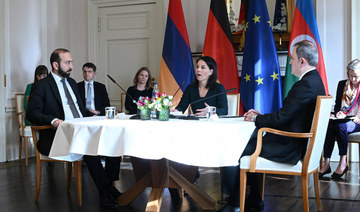BRUSSELS: Hungarian Prime Minister Viktor Orban on Friday blocked $55 billion (€50 billion) in EU aid for Ukraine, after leaders side-stepped his opposition to agree to open talks with Kyiv on joining the bloc.
A crunch summit in Brussels broke up after a day of wrangling as the Hungarian authoritarian leader refused to greenlight funding to help prop up Ukraine’s government over the next four years.
Orban called for unblocking all of the still-frozen funds from the European Union for his country, before considering lifting his veto on further aid to Ukraine
“This is a great opportunity for Hungary to make it clear that it should get what it deserves. Not half, then a quarter, but it must get the whole thing,” Orban said in an interview with Hungarian state radio.
“So we want to be treated fairly, and now there is a good chance that we can assert this,” he added.
The wrangling injected a bitter note over the summit, a day after the leaders – minus Hungary – made the historic decision to open talks with Ukraine on it one day joining the bloc.
The second day of the summit was expected to turn to the Israeli-Hamas war in Gaza, and the search for a common EU position on it.
EU countries are divided between those backing calls for a ceasefire in Gaza – supported by the overwhelming majority of the UN General Assembly – and those supporting the stance of Israel and the United States that a ceasefire would bind Israel’s hands as it tries to destroy Hamas.
With the issue of grants and loans to Ukraine blocked by Hungary, the 26 other EU leaders have decided to hold a fresh meeting early next year to try to thrash out an agreement.
The blockage from the Hungarian nationalist – Russia’s best friend in the EU – dealt a blow to Kyiv and its backers only hours after they had celebrated the door opening to accession talks.
Kyiv is urgently trying to change the narrative that backing from its Western allies is waning as doubts swirl over support from the United States.
Orban agreed to step out of the negotiating room to allow the other EU leaders to take the consensus decision without him.
But on social media he railed against the “completely senseless, irrational and wrong decision.”
The other EU leaders hailed the move – which also included agreeing to launch accession talks with Moldova – as a crucial moment.
Ukraine’s President Volodymyr Zelensky, who did not attend the knife-edge summit, called the decision “a victory that motivates, inspires, and strengthens.”
Along with the nod to Ukraine, the EU leaders also agreed to open membership talks with Moldova. Moldovan President Maia Sandu said her country had turned “a new page today.”
The White House – which faces opposition from US Republicans to support for Ukraine – hailed a “historic decision.”
The agreement to open membership negotiations with Kyiv does not mean that Ukraine will be joining the EU any time soon.
Before the talks can be launched, EU states must agree on a negotiating framework – giving Orban ample opportunity to stall the process again.
Most EU leaders wanted this week’s summit to send a sign of solidarity with Ukraine 22 months after Russia launched an all-out invasion.
But any decisions must be unanimous – or at least unopposed – and Orban initially insisted a decision on funding could wait until after next June’s European elections.
Critics have accused the Hungarian leader of holding Kyiv’s survival hostage in a bid to force Brussels to release billions of euros of EU funds frozen over a rule of law dispute.
In what some saw as a last-minute concession, the European Commission, the EU’s executive, agreed on Wednesday to unblock €10 billion of that cash. Another €21 billion remains out of Orban’s grasp.
Beyond Orban, other EU leaders stressed the need for unity and to send a strong signal of support for Ukraine, which has already seen Washington’s support threatened by maneuvers in the US Congress.
The leaders said the bloc had agreed to a 12th round of sanctions on Moscow, targeting Russia’s lucrative diamond exports and aiming to tighten an oil price cap.
But the situation on the battlefield in Ukraine does not look promising for Kyiv after a summer counter-offensive failed. Putin boasted on Thursday that he has 617,000 troops in Ukraine, and that their positions are improving.
Across Brussels, at NATO HQ, alliance secretary-general Jens Stoltenberg warned that the West must continue supporting Ukraine in order to protect the rest of Europe.
“If Putin wins in Ukraine, there is real risk that his aggression will not end there. Our support is not charity – it is an investment in our security,” he said.
























